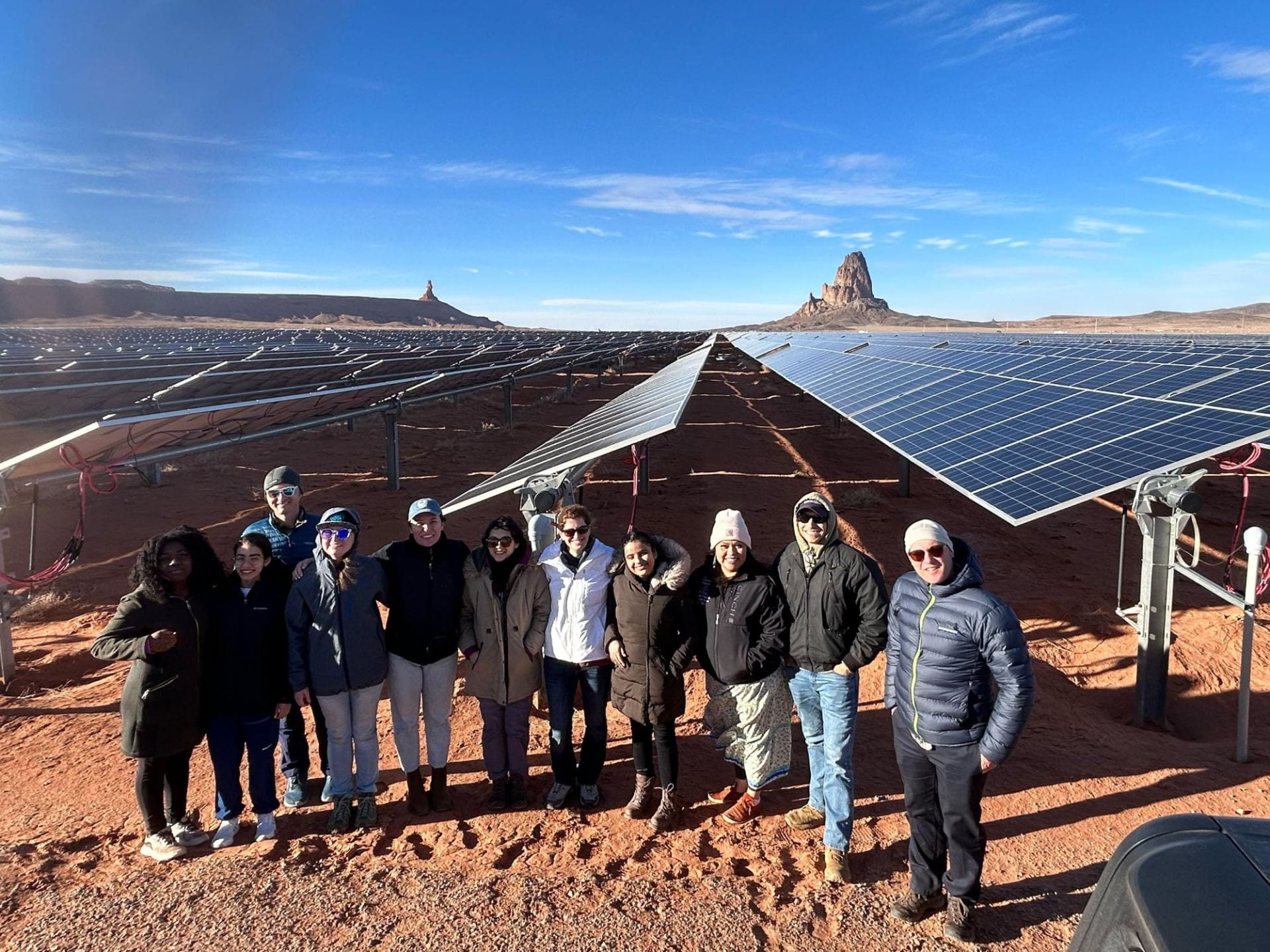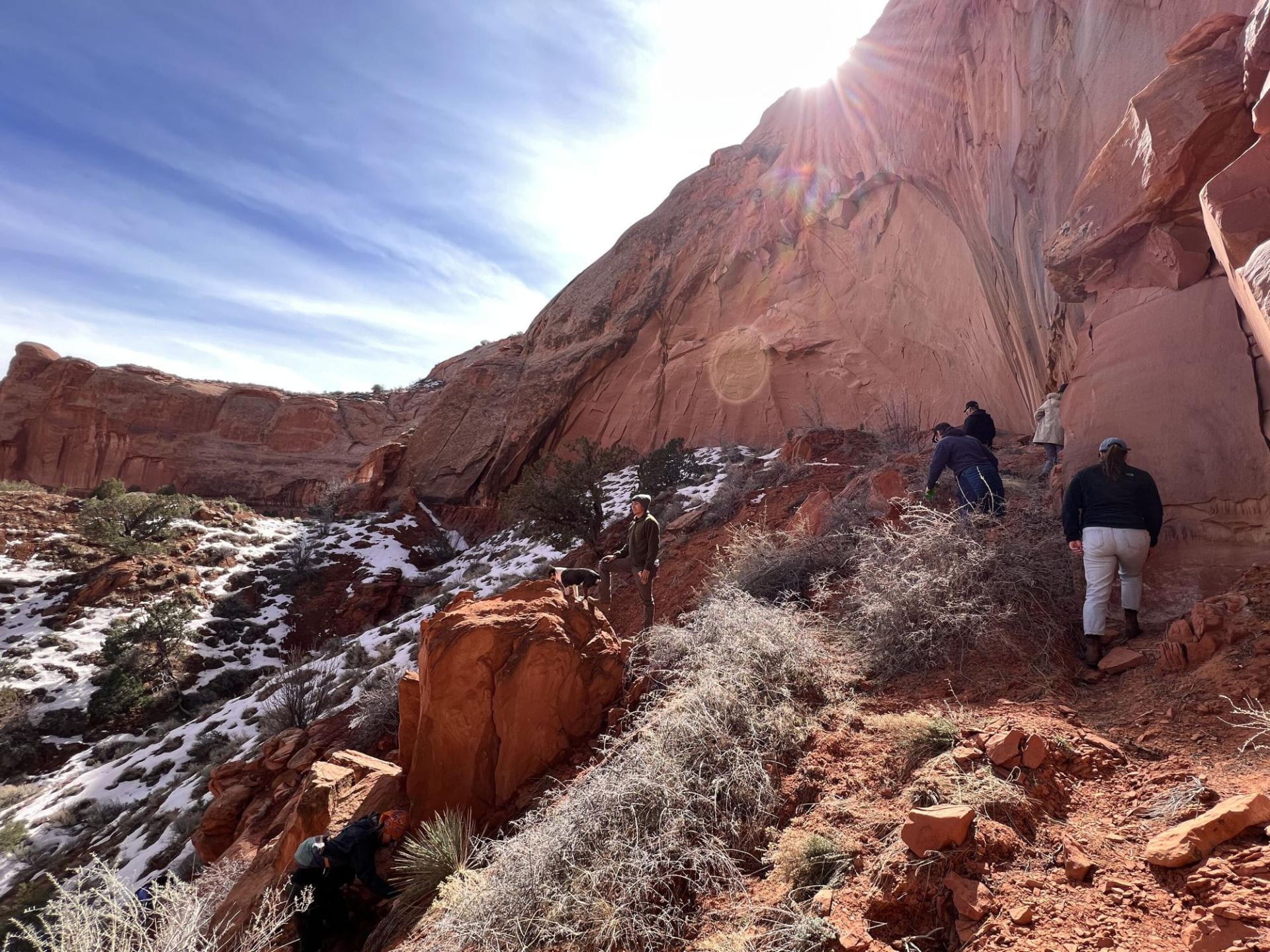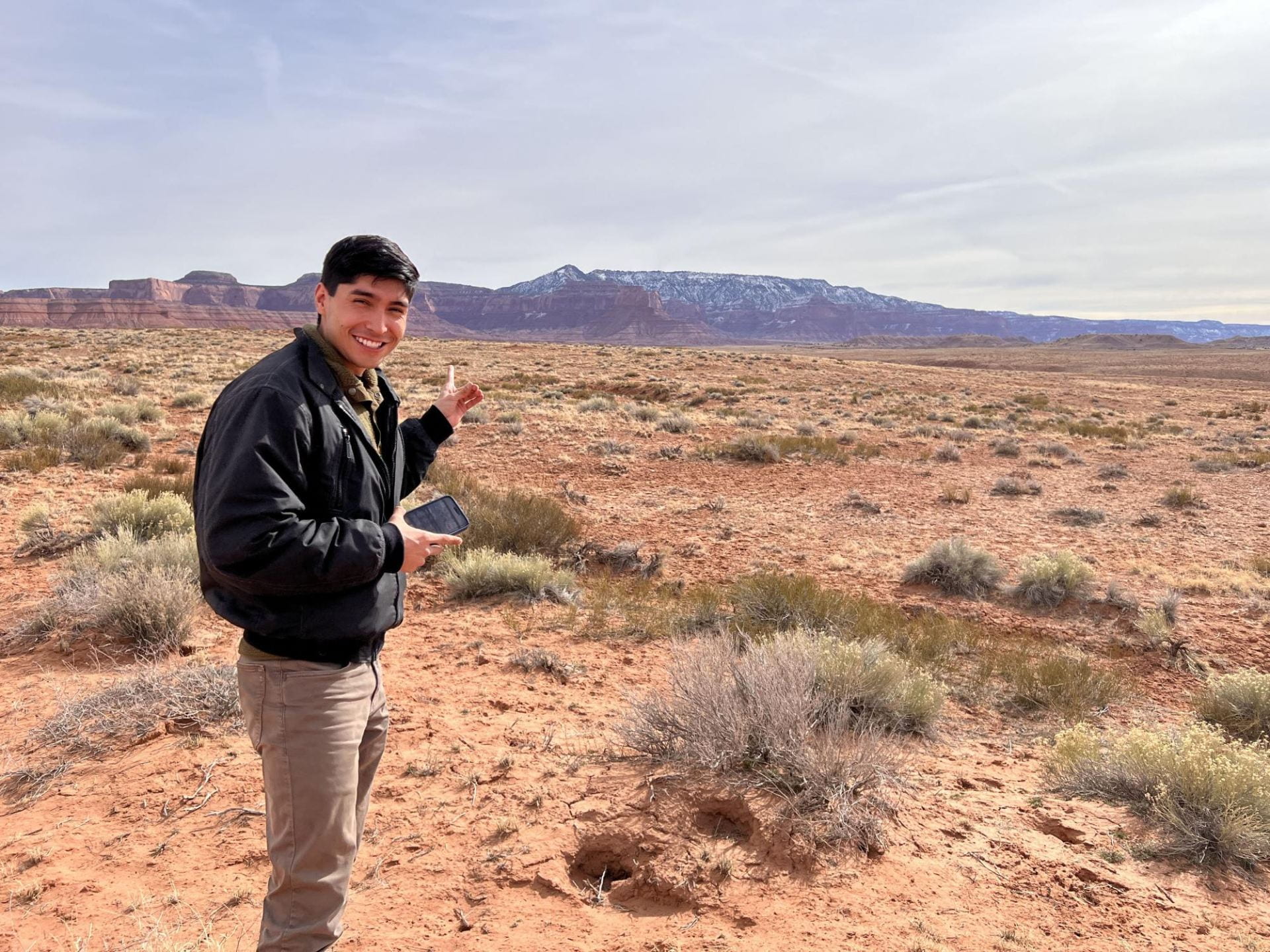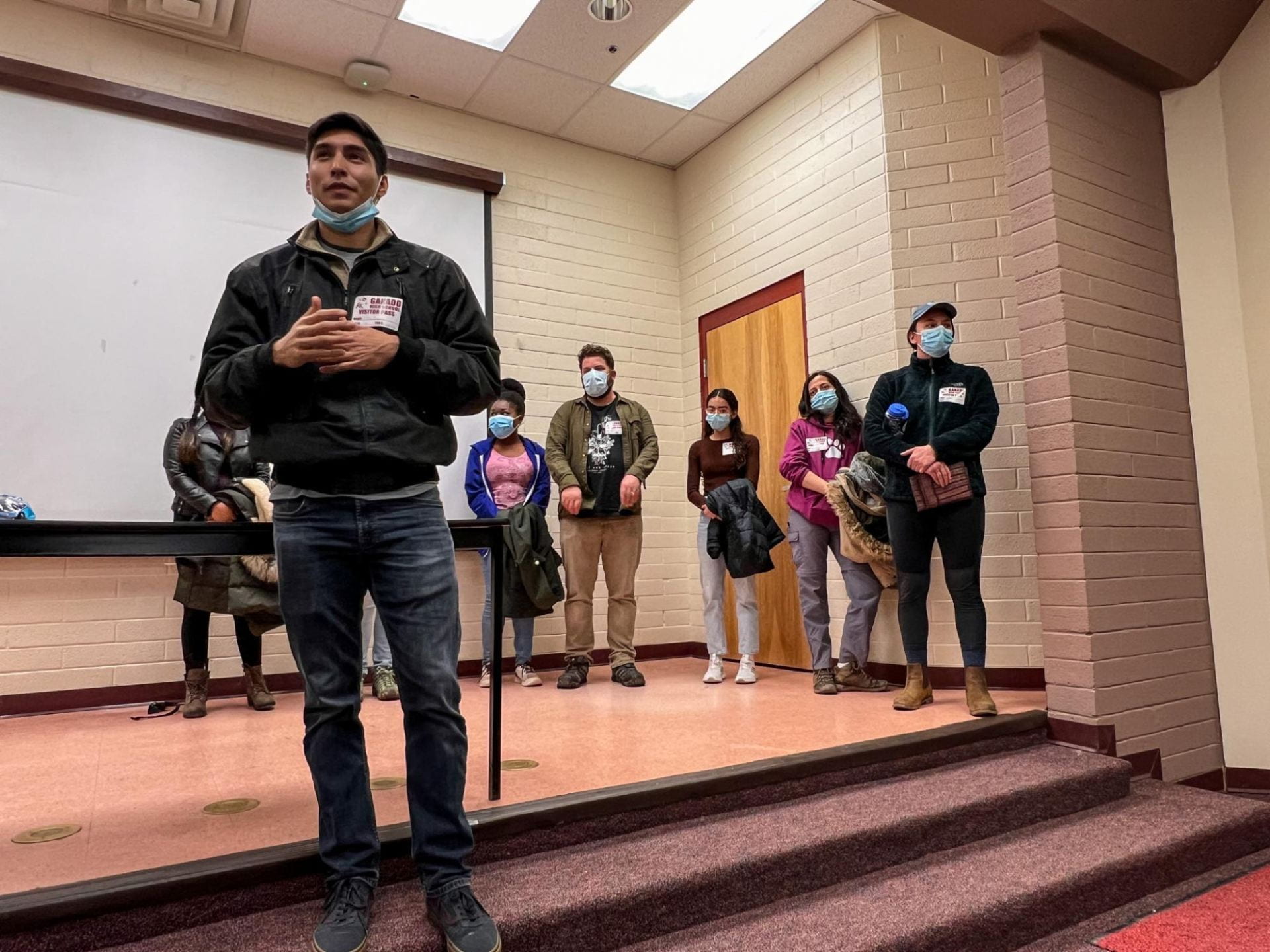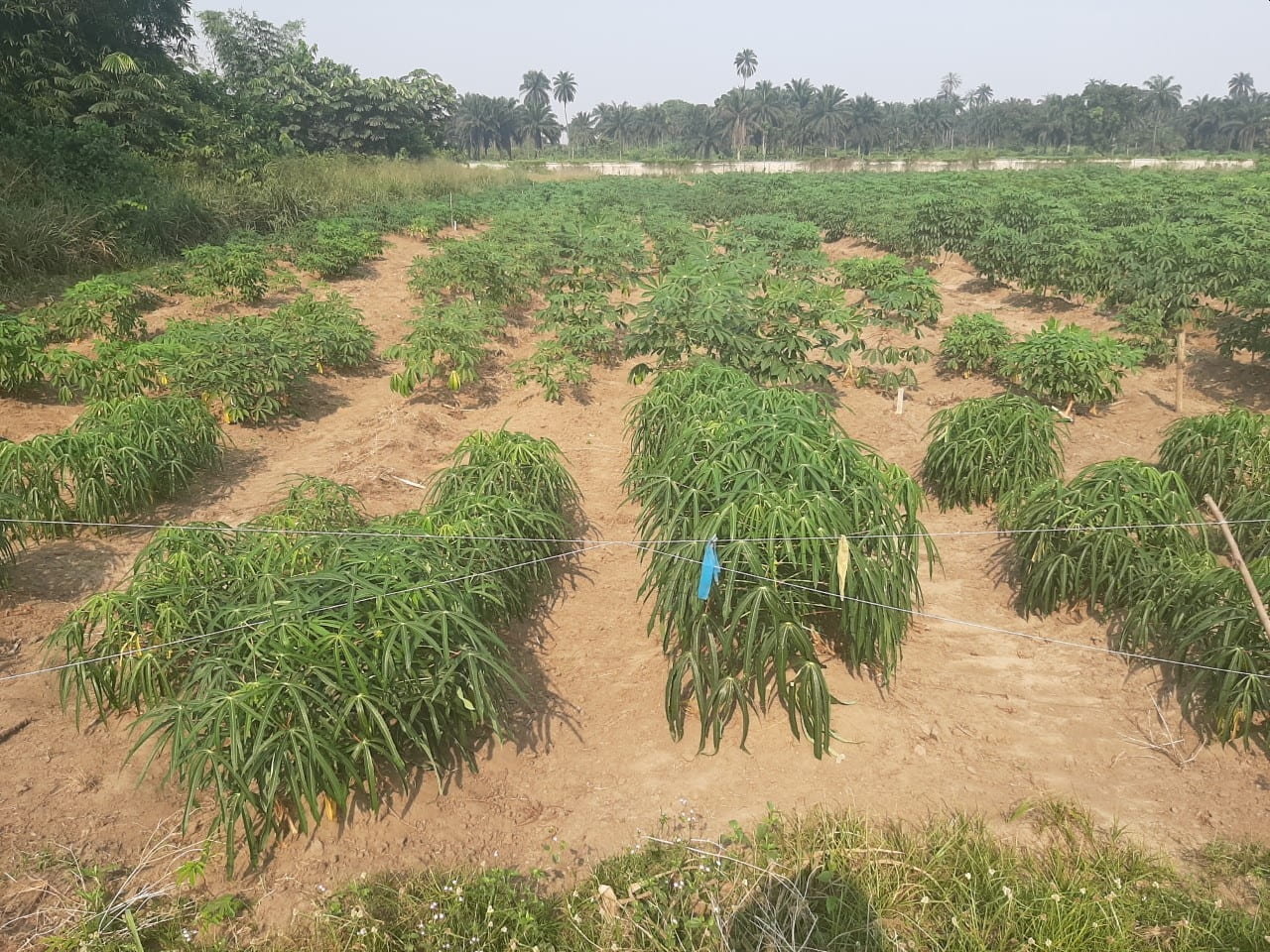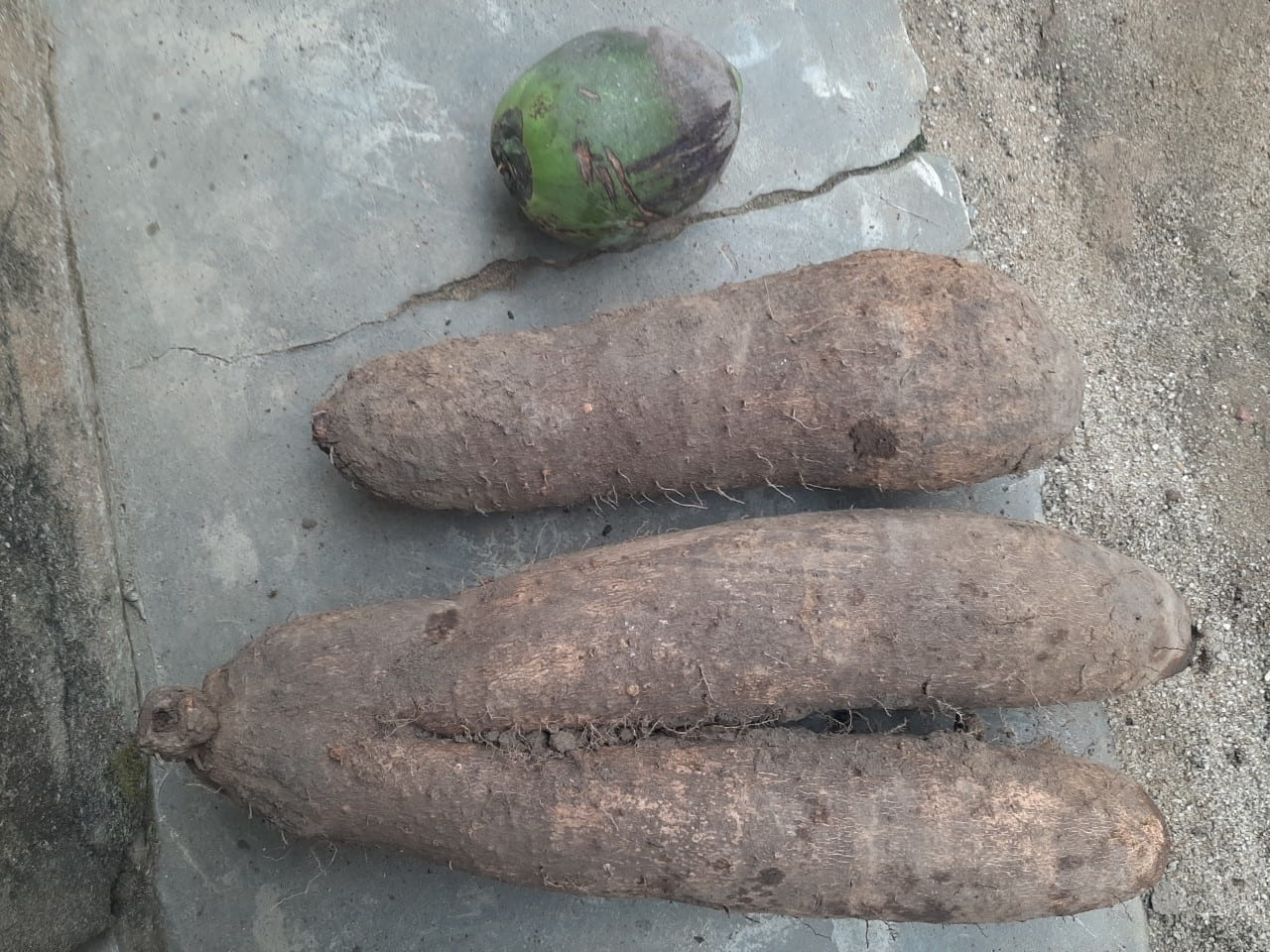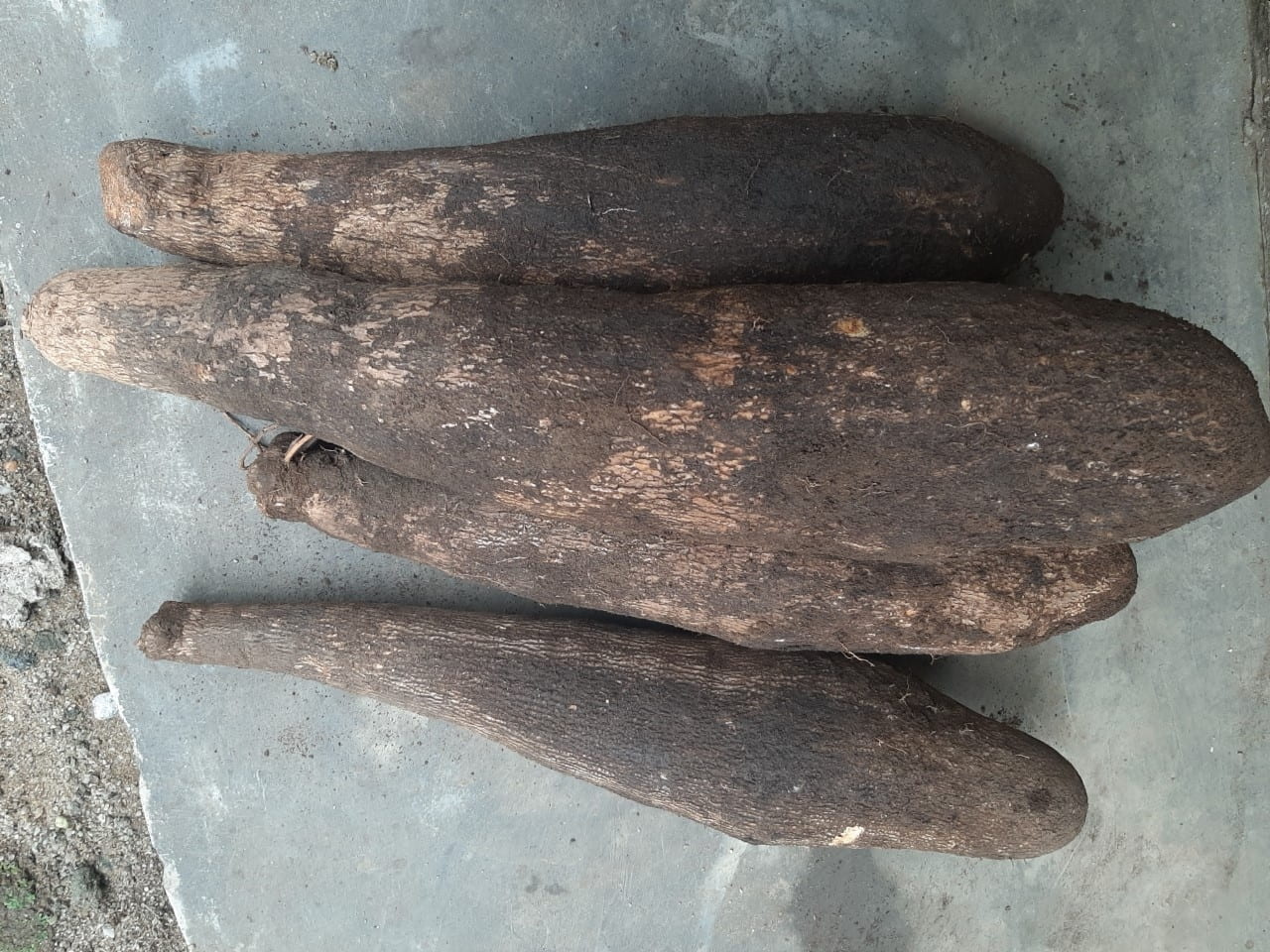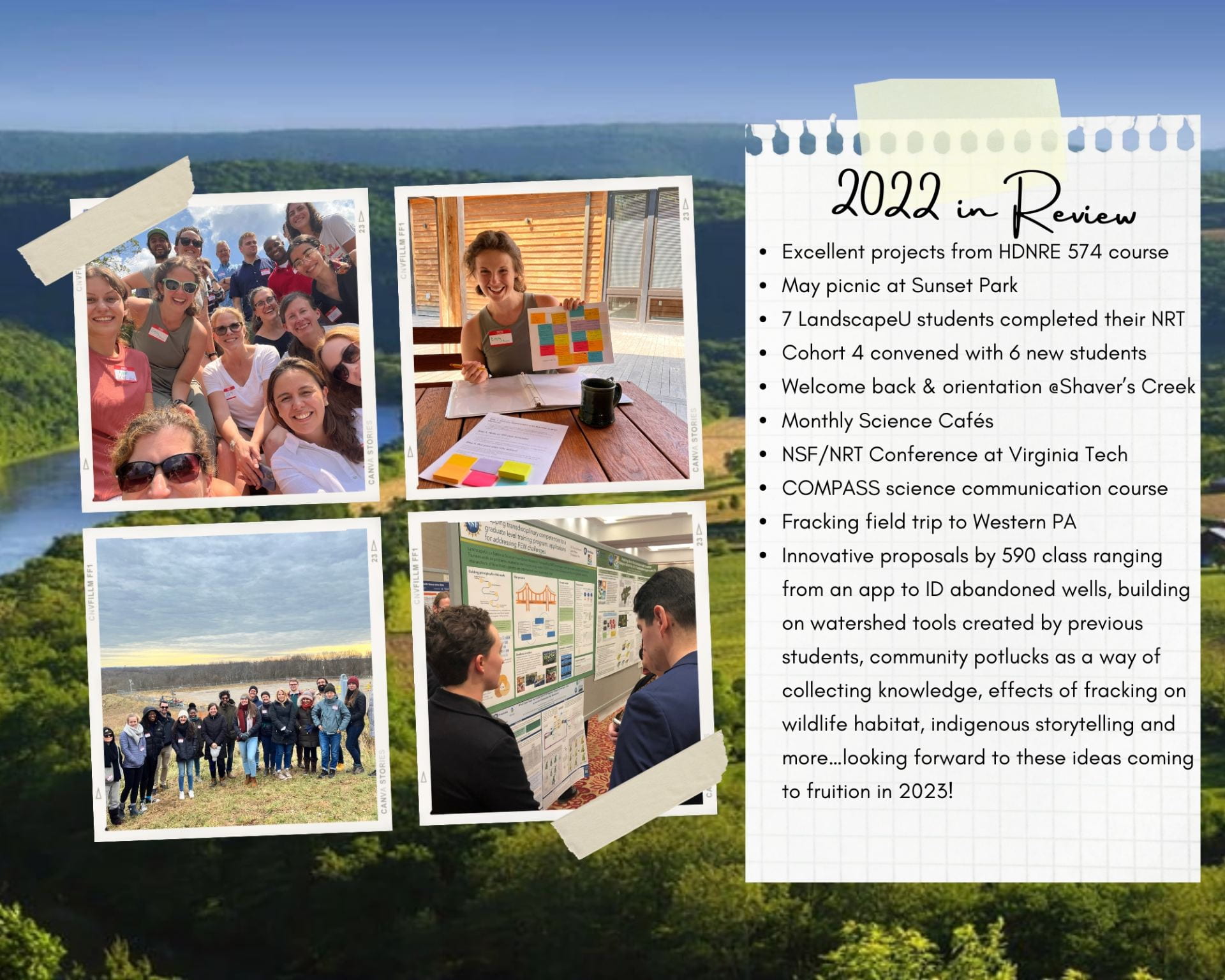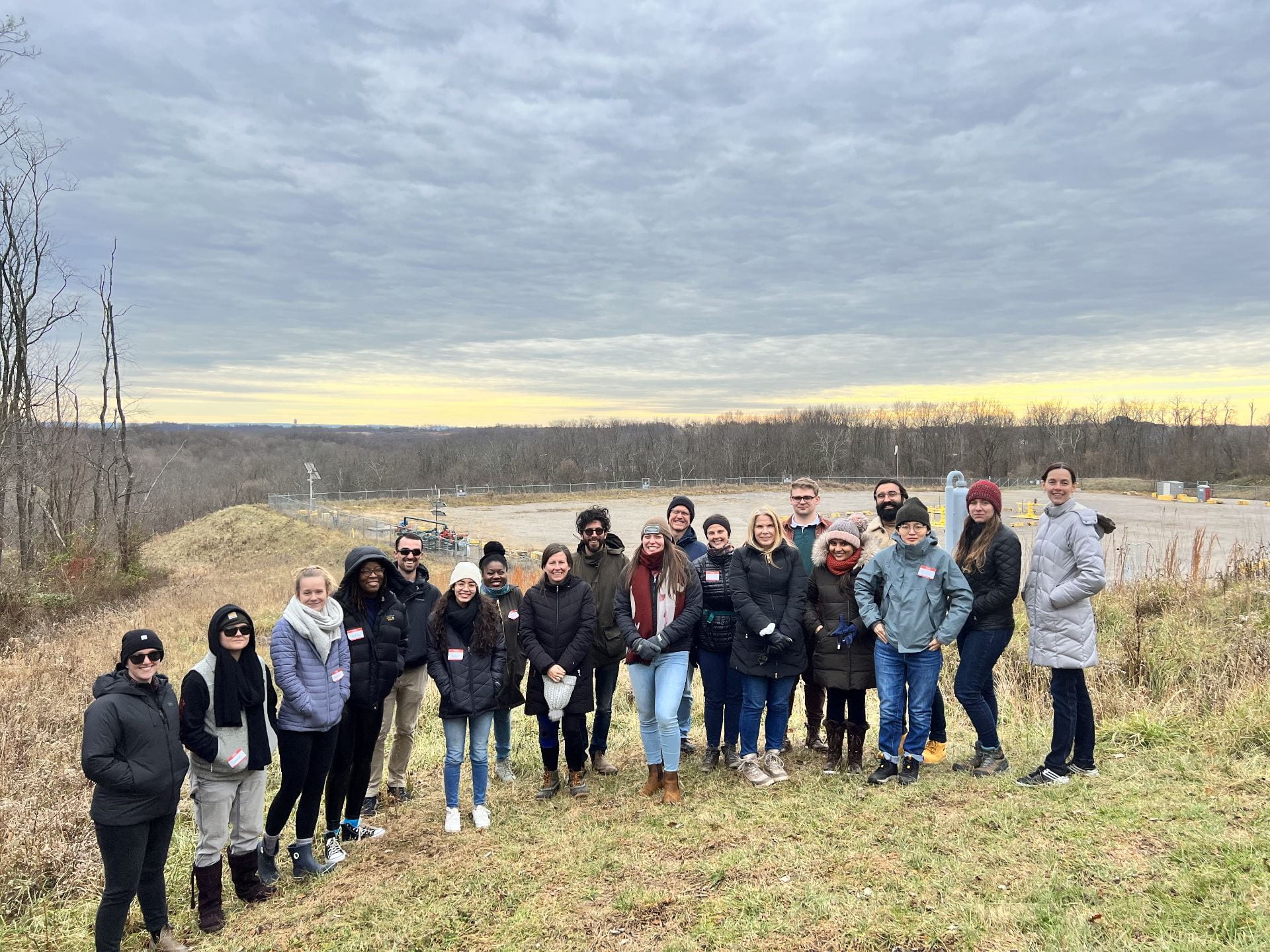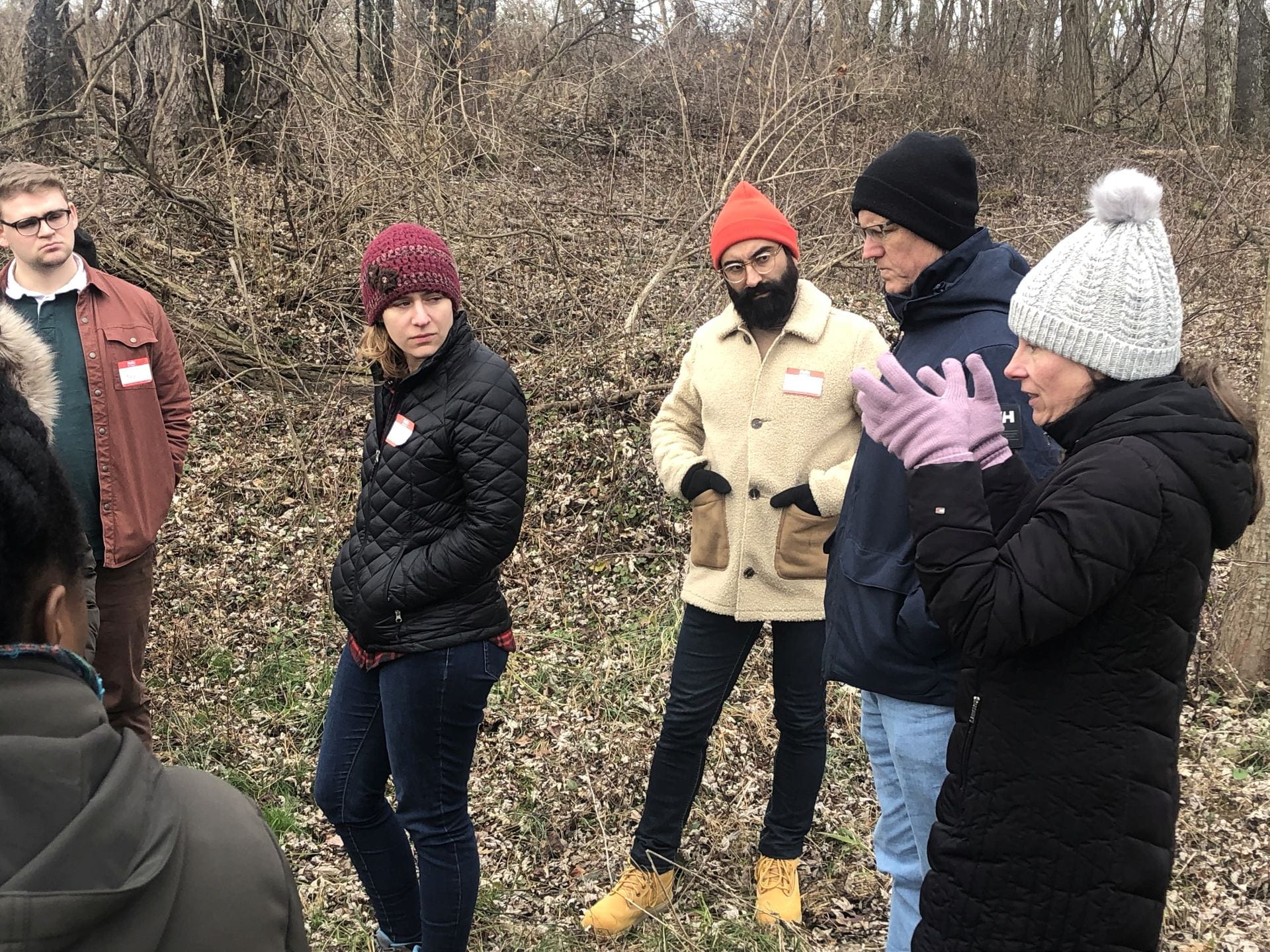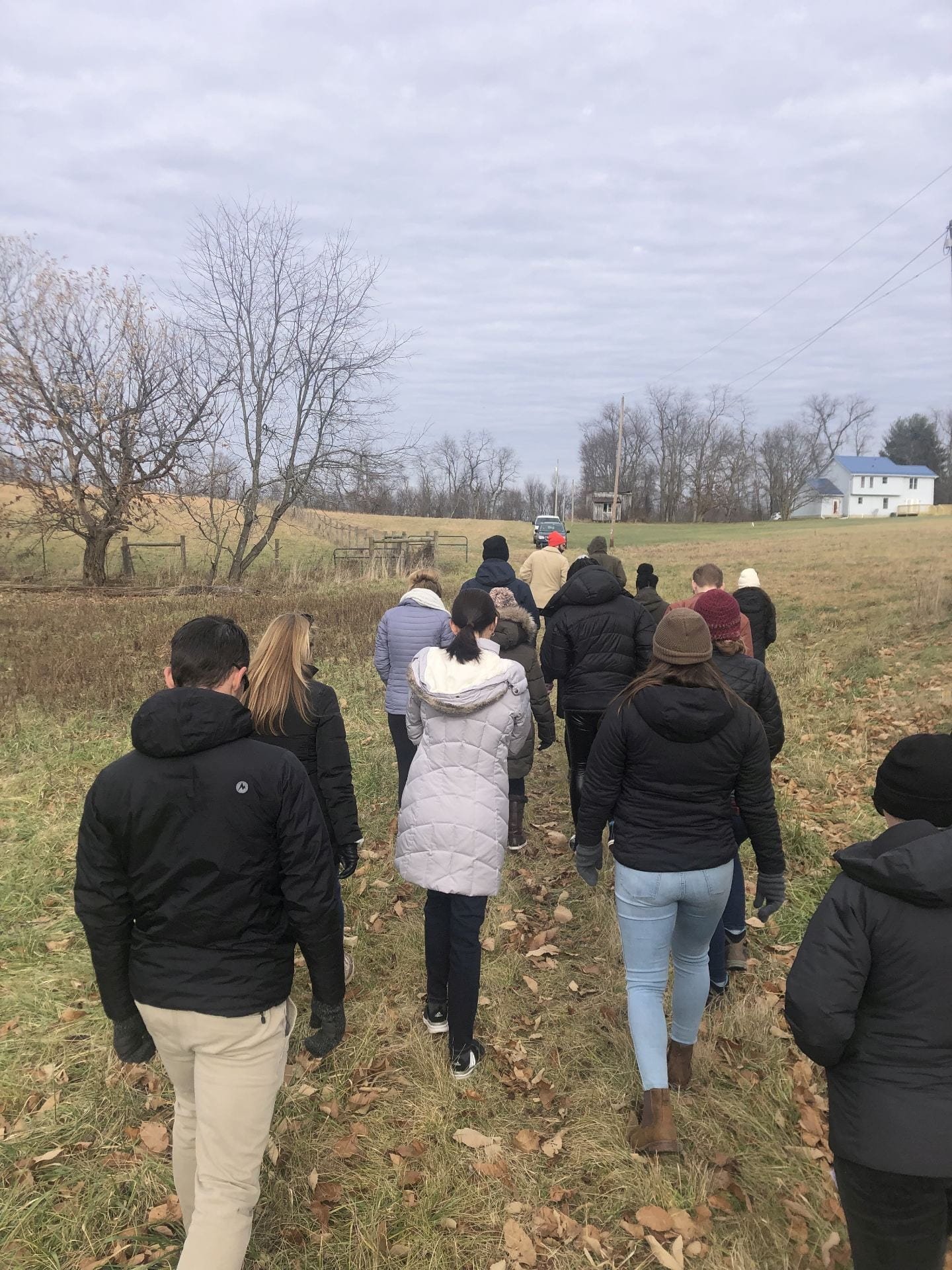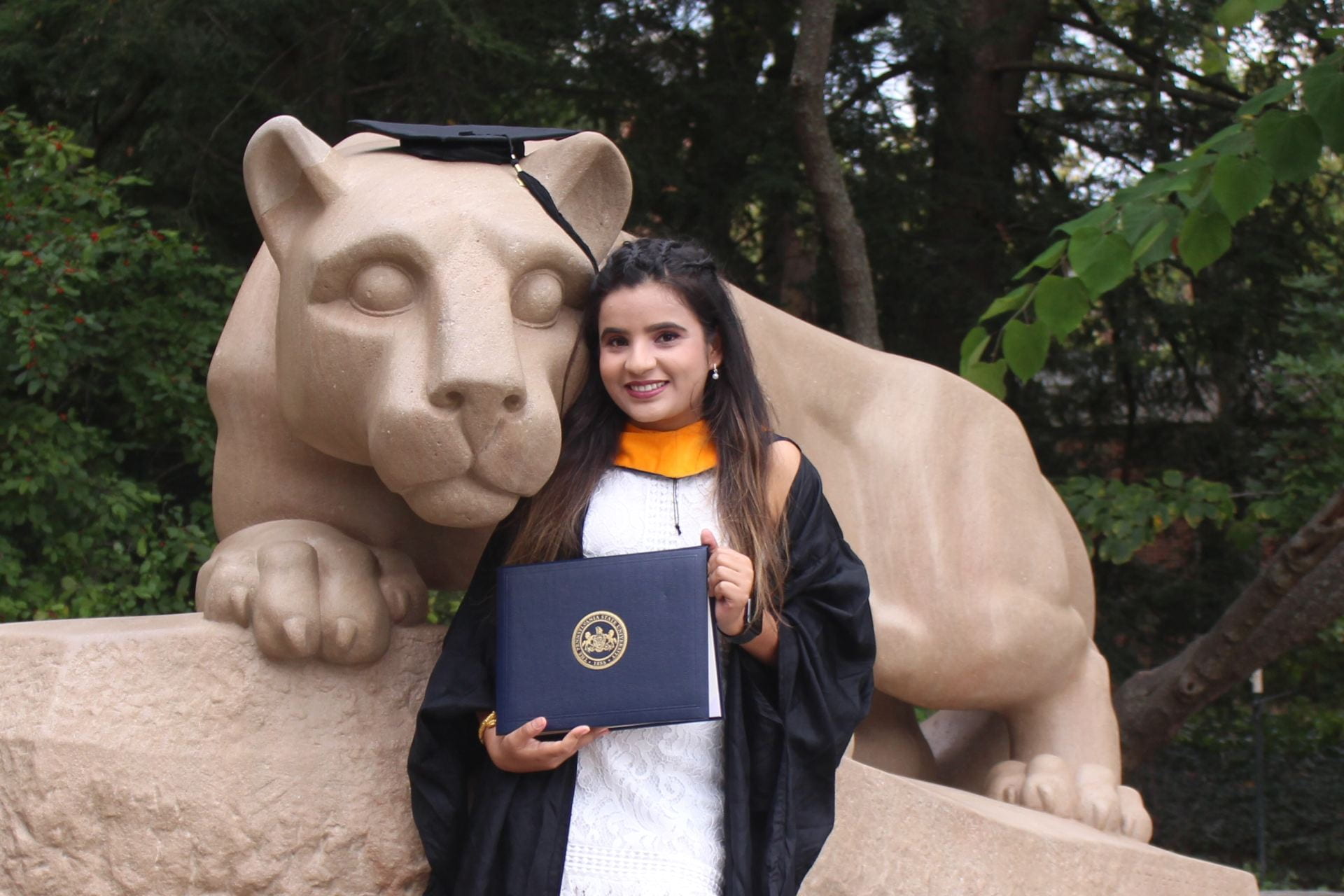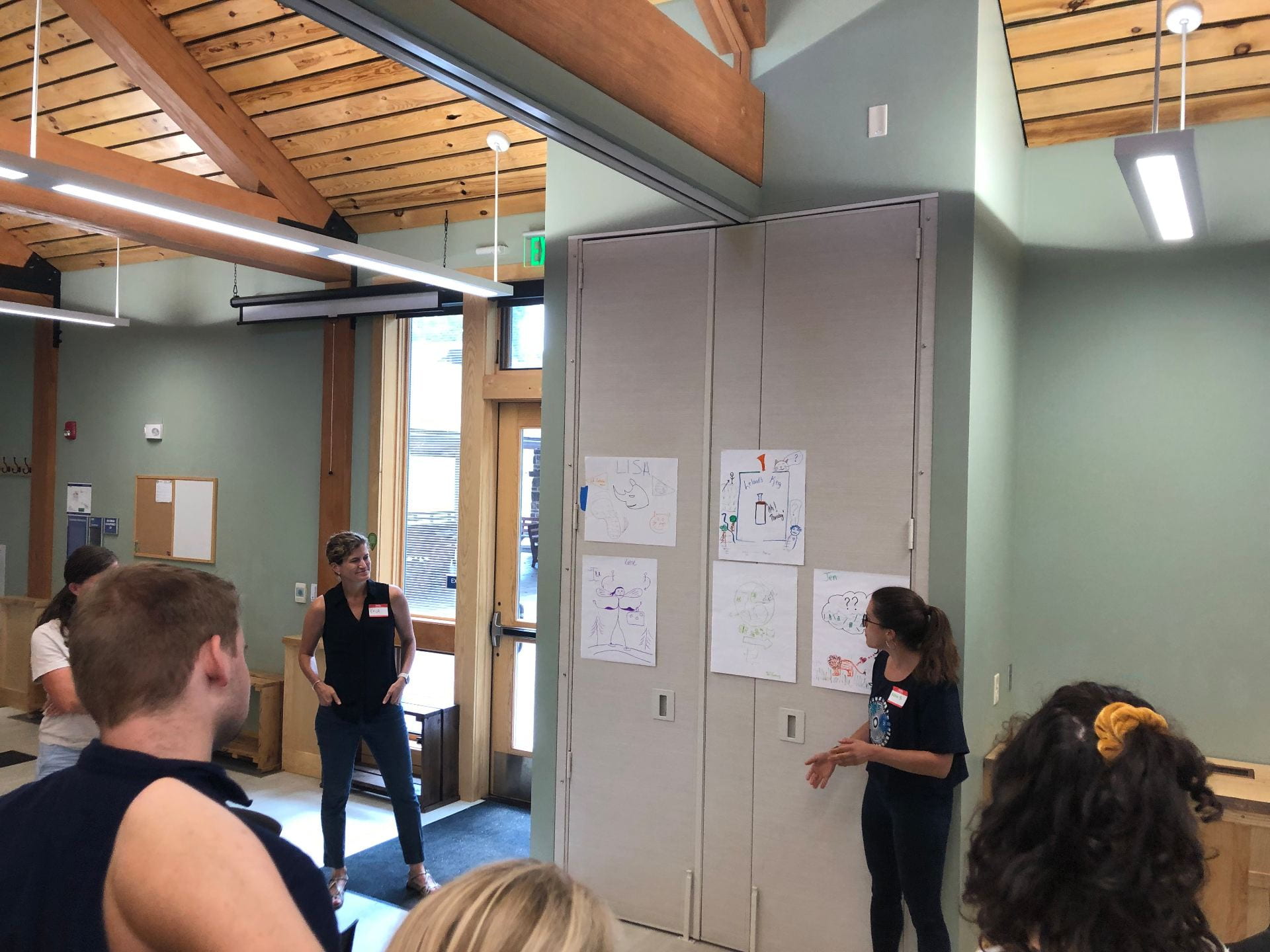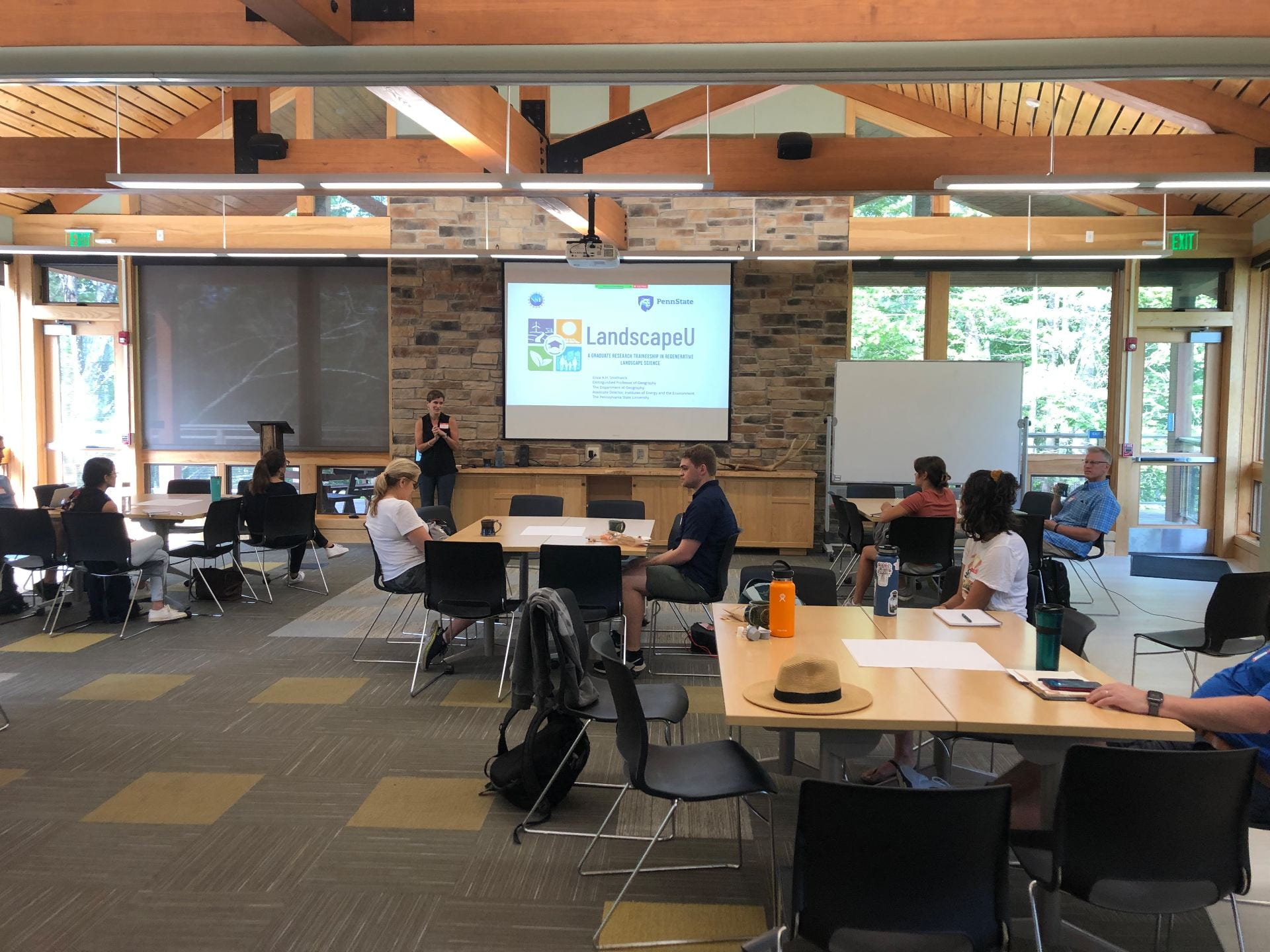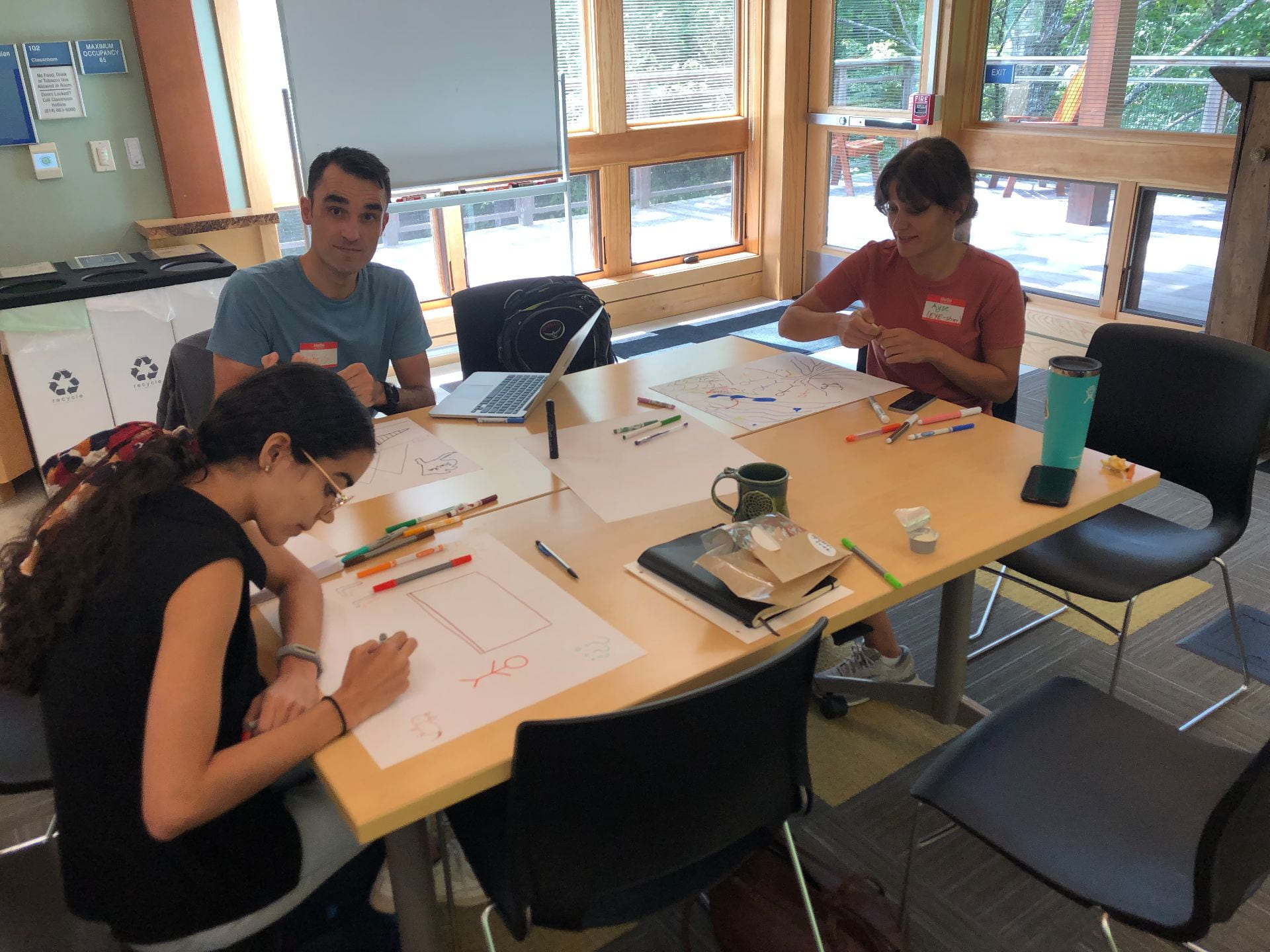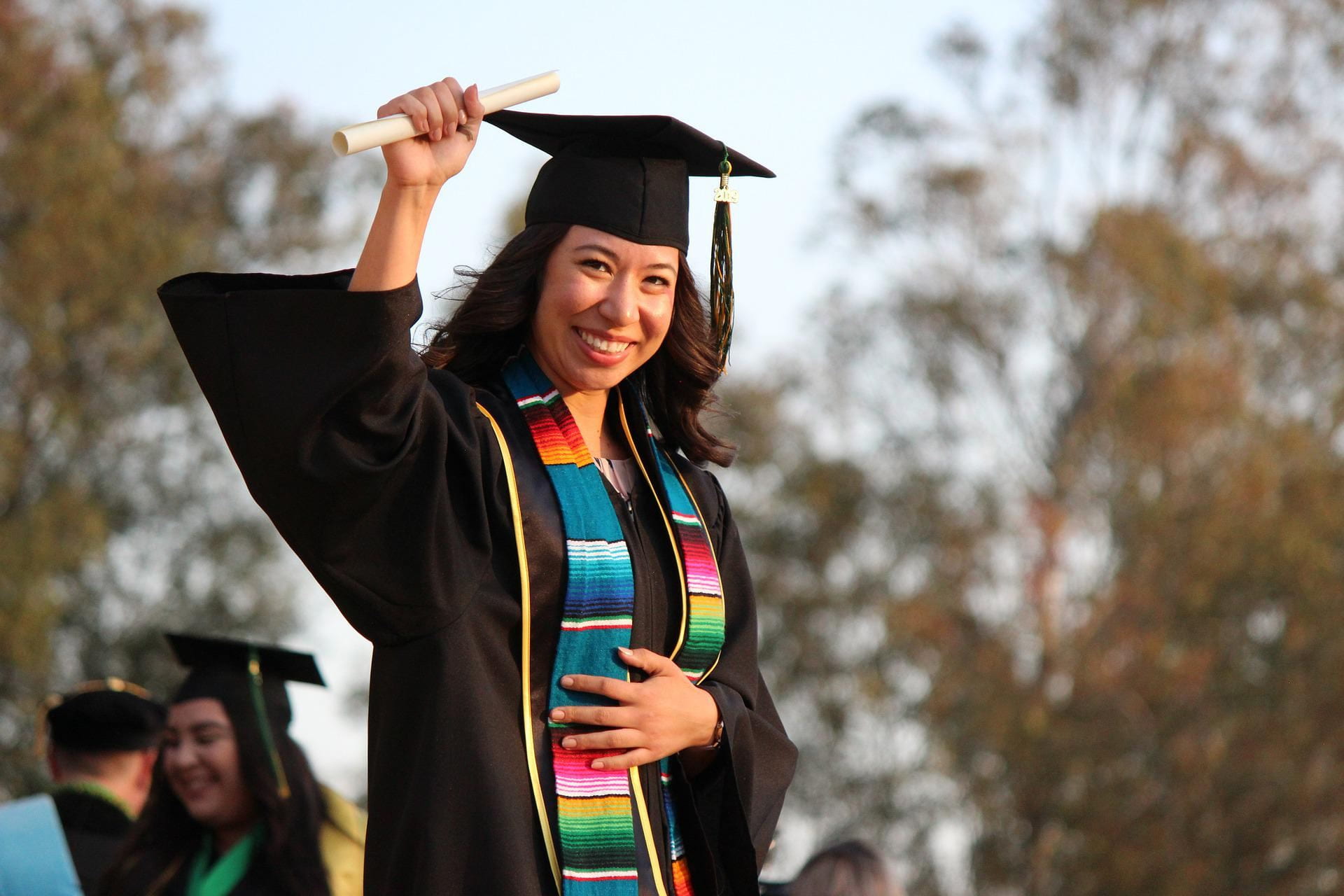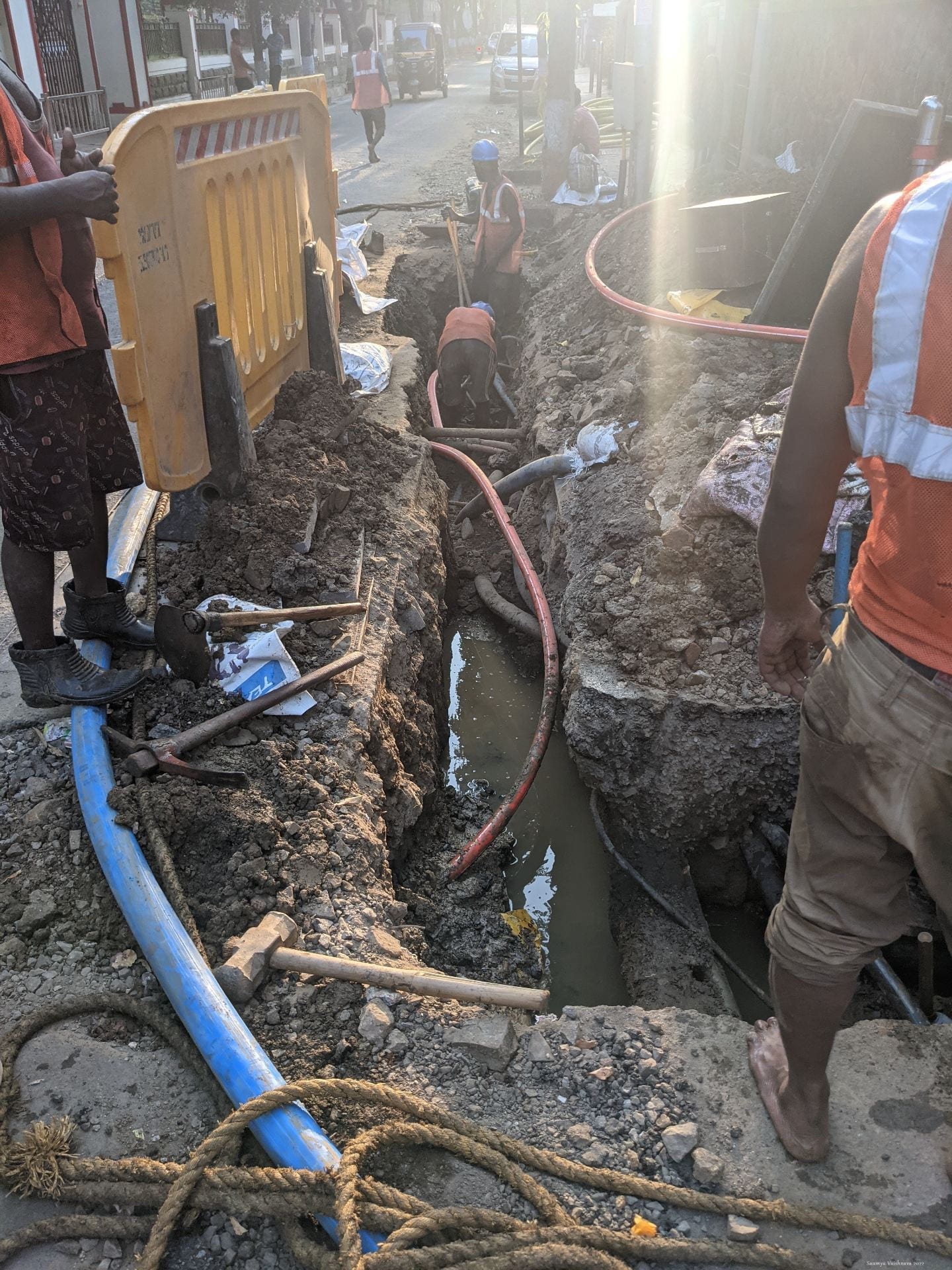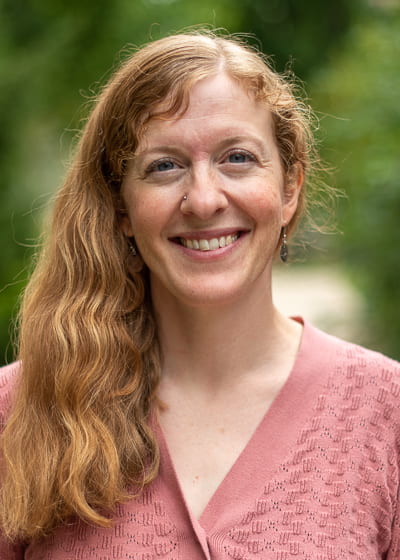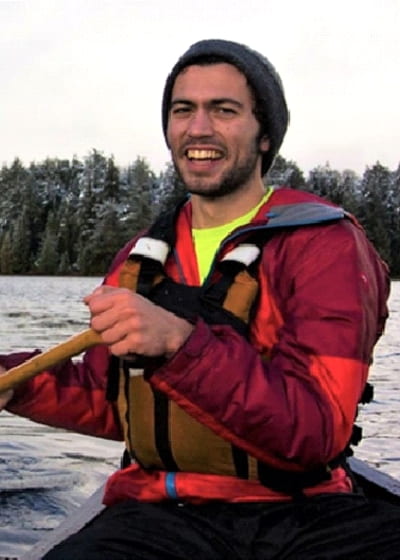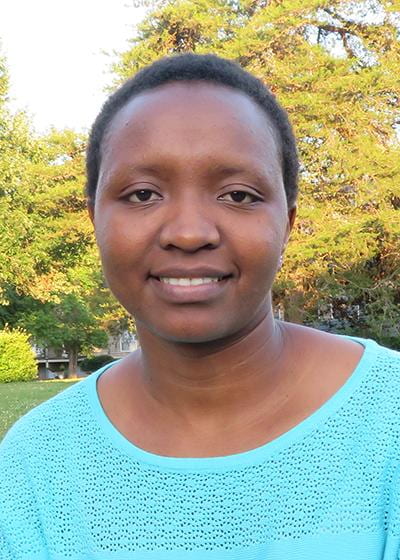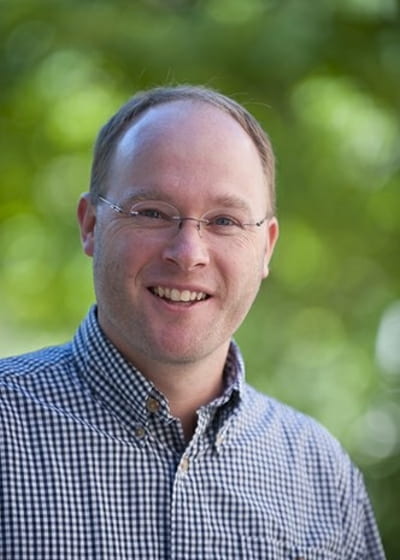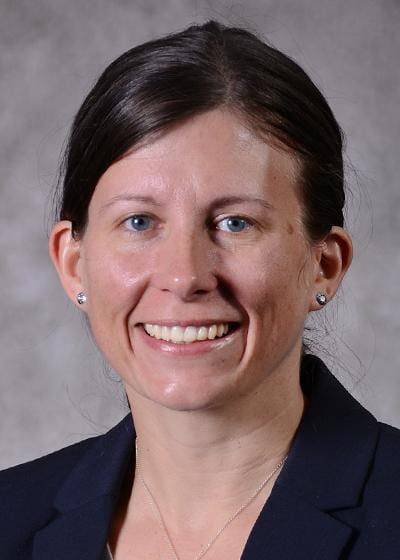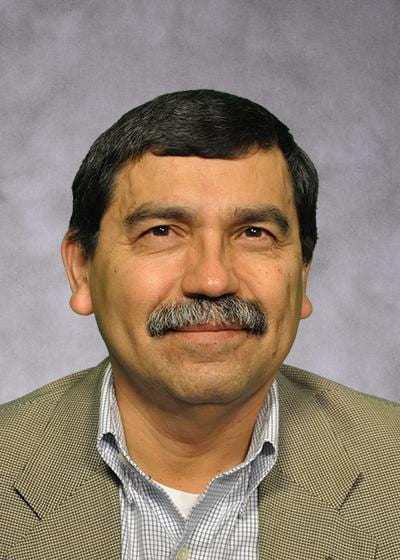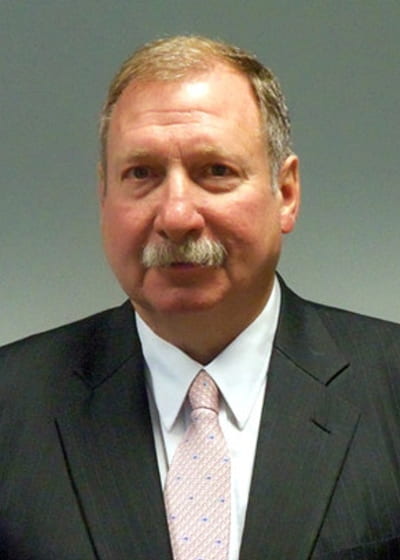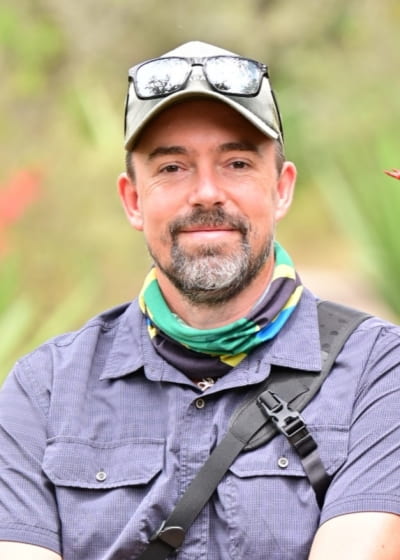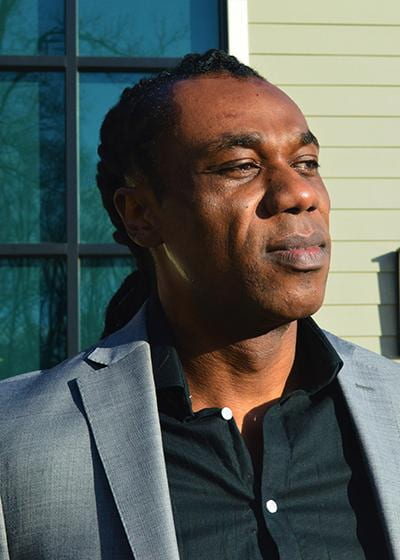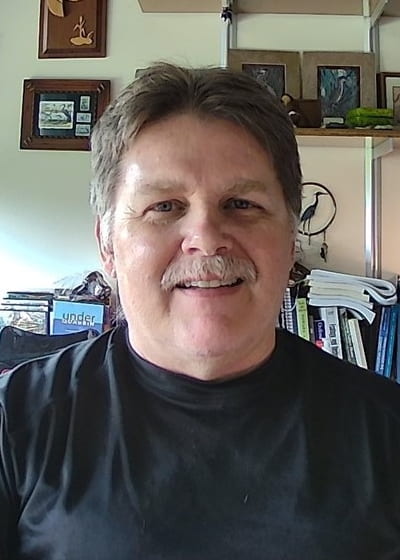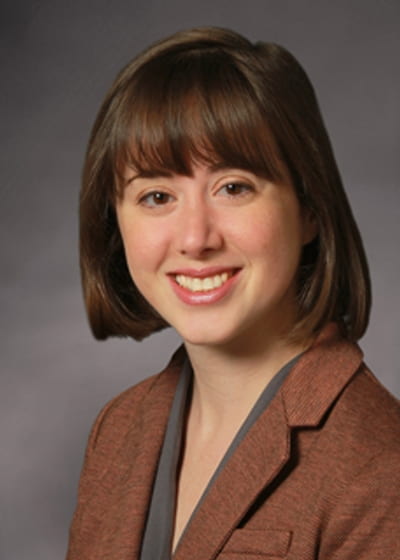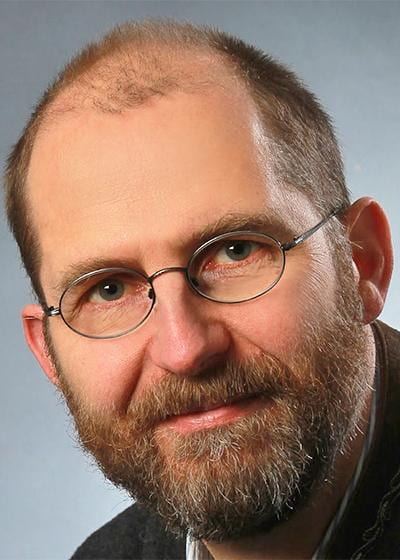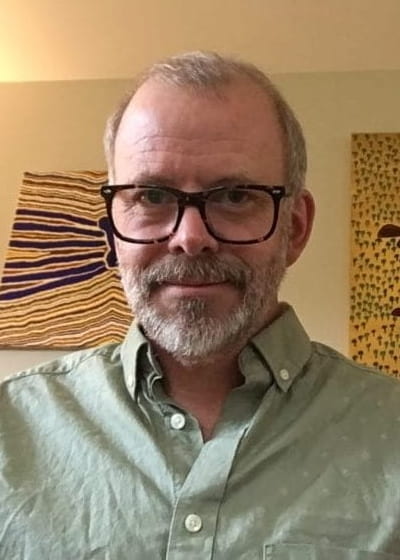July 2023
This year we had 10 students complete their traineeship requirements with a couple more that will finish by the end of the summer.
2023 Trainees:
- Lauren Dennis
- Zachary Goldberg
- Susan Kotikot
- Paniz Mohammadpour
- Ruchi Patel
- Mei-Huan Chen
- Marissa Kopp
- Timothy Mateer
- Katie Bernhard
- Amy Wrobleski
Adrian, Paulo, Saumya, Stephanie, and Nastaran all finished up in 2022. We are proud of all our LandscapeU National Research Trainees!
Highlights from the 2023-24 School Year:
Over spring break 2023, seven trainees and five LandscapeU Faculty traveled to Arizona to participate in a transformational research experience. Read the Penn state News article here: Landscape-U program connects grad students with Navajo Nation
Penn State Landscape-U participants hike on graduate student Tim Benally’s family’s land. Credit: Courtesy of Erica Smithwick. All Rights Reserved.
Penn State graduate student Timothy Benally gives a tour of his family’s land on the Navajo Nation in Arizona. Credit: Photo courtesy of Erica Smithwick. All Rights Reserved.
We would also like to welcome our new and final cohort of students: Diana Albuja Carbonell, Lara Garcia and Lisa Vebber. Bios will be coming soon.
February 2023
Ledeebari D. Banuna
Internship Reflection-Landscape U NRT Fellowship
Internship site: IITA Onne High Rainfall Station, Nigeria
During my short-term internship at the IITA Onne High Rainfall Station in Nigeria in December 2022, I worked on a survey project and spent a day touring some of the focus areas at the station. I was interested in interning at the station to learn more about what the station does, how they engage with local communities and farmers, and network with the staff there.
For my internship, I was tasked with a a self-guided project to develop a checklist questionnaire that would capture information about the cultural, economic, and agronomic dimensions of white yam use and production among the local Ogoni ethnic nation. The project rationale was that the IITA Onne has been focused on cassava but is planning to expand into working with the white yam species, Dioscorea rotundata, in the near future. They would like some advance knowledge of indigenous white yam cultivation in Ogoni to help inform the future intervention.
I learned a lot during the process of creating the survey. It was important to scale the project brief to make it work well for the short duration of my internship. I also needed to narrow down our inquiry, so that we could create a questionnaire that captured what we wanted to know in survey format. By focusing on the agronomy and seed practices and including background questions about the socioeconomics of white yam production, I was able to iteratively refine the questions until I ended up with a 88-question survey.
Once the questionnaire was approved by my supervisor it was time to test it with farmers. The questionnaire created during my internship can be used by the IITA Onne to survey farmers in the various communities and kingdoms to get a better understanding of cultural attitudes, socioeconomic factors, seed practices, and the agronomic aspects of white yam production there.
Fun question: Can you tell the differences between the white yam varieties (not cultivars) in Fig 3 and 4?
Photo Credits: All pictures taken by Ledeebari D. Banuna
February 2023
 Loading...
Loading...
January 2023
Frackland Tour Field Trip
On December 2, 2022, 14 students from LandscapeU and HDNRE 590 traveled around Washington County, the most heavily fracked county in the state of Pennsylvania.
Lois Bower-Bjornson, who works for Clean Air Council and who lives in Washington County, led the “Frackland Tour”. She began by giving us a brief explanation of fracking, its health effects, and the plans for the build-out of natural gas and petrochemical infrastructure in the region. We visited the construction site of the largest well pad in North America, as well as several other well pads. We talked about residents and how they have been negatively impacted as well as the impacts on air, land, and water. Dr. Jenn Baka also shared her knowledge of fracking and her work with local NGOs as she studies the social, political, and ecological processes sustaining industrial society. Overall, it was a very informative excursion!
Our students will have a chance to delve into fracking research if they are taking TREES 574 this spring and participate in the FracTracker project scope. FracTracker Alliance is interested in better understanding the impacts of an expanding petrochemical presence in southwestern Pennsylvania. They are hoping to have students map the footprint of related facilities in the region, which will be the foundation for subsequent analyses. This project may use a variety of techniques and data to achieve this goal, including georeferencing aerial or satellite imagery, investigation of state and federal datasets, and analysis of local parcel data, where available.
November 2022
Sadie Sharma
This year, I attended the 2022 Society of American Foresters National Convention between the 20th and 24th of September in Baltimore, Maryland. This was my first in-person meeting after the COVID pandemic. The conference brought together more than 700 participants and I enjoyed meeting, greeting, and connecting with colleagues, science professionals, agency leaders, and dignitaries. I was very excited to expand my network, listen to speakers, present my work, and multiply my knowledge. Moreover, meeting high school friends from Nepal was rejoicing.
In the session “carbon and climate matters”, I presented our recent work on forest owner willingness to accept payment (WTA) for forest carbon in the United States. This work was supported by Forest Landowner Association (FLA) and Penn State Extension. I believe our work will help and support the nation’s carbon emission reduction agendas by shedding light on factors influencing forest owner WTA payment for carbon and different contracts and payment levels preferred by forest owners. Our study revealed the importance of carbon contracts design in determining the price of carbon sequestered in private forests. Further, the existing carbon payment programs appear to attract only early adopters. We believe that an increase in the price of carbon could attract more participants in the carbon market program. Also, timber-production-oriented owners’ resistance towards carbon payment programs may help soften implications of delay in harvest on domestic timber supply. Importantly, we see the need for outreach and education programs to engage passive forest owners.
Our work had appeared in a reputed peer-reviewed journal “Forests” about a month before this conference. You may find the link to the paper here: https://doi.org/10.3390/f13091346. I was happy to find that our research was well received by many scientists and universities. Later, I had the privilege to go for dinner with professors and post docs from Oklahoma State University, Mississippi State University, and University of Arkansas. I am immensely thankful for the financial support provided by the NSF LandscapeU program to attend this conference.
The conference was indeed a very influential event to network and learn new things.
September 2022
Welcome Back!!
LandscapeU students, staff, and faculty gathered at Shaver’s Creek Environmental Center on August 26th. This was an orientation for our latest cohort of students, as well as a welcome back to returning students. We spent the morning getting to know our new students through teambuilding and learning more about the NRT program. The afternoon was filled with a tour of the Environmental Center, more teambuilding, and a workshop on creating and maintaining Individualized Development Plans. It was a great day together!
July 2022
LandscapeU has several things to celebrate! Saumya Vaishnava and Paulo Soares are our first students to complete all requirements of the National Research Trainee program. We are very proud of their accomplishments and wish them all the best. They will be featured in a story soon, so stay tuned!
Add picture of stock image of graduate until I get a photo from Saumya and Paulo (attached)
We also would like to welcome our new cohort of students: Emma Chiaroni, Rachel Cruz Perez, Elliott Foust, Melanie Jones and Ben Townsend! Read more about the new students here.
About LandscapeU, Saumya Vaishnava stated “I thoroughly enjoyed the NRT program. The training requirements, especially the group project, the internship, and the COMPASS communication program, helped build my research skills. They helped me think through my dissertation project and my research dissemination plans. I know these are called ‘requirements’, but they worked quite seamlessly with my coursework. As I continue my research on energy landscapes in India, I find myself referring back to the notes I had made over the course of the LandscapeU trainings.”
June 2022
Sarah Potter
Education Program Coordinator
“LandscapeU is such a unique program. I am honored to be working with this diverse and talented group of students and faculty. They are laying the groundwork for the health of our future world. I look forward to being a part of this team!”
Sarah Potter joined the LandscapeU team in Spring of 2022. She hopes to contribute to the excellent work of the program by being a connector and coordinator for students and faculty. Sarah comes to this work from a diverse professional background. She earned her undergraduate degree at Penn State in Agricultural Education and holds teaching certifications in Environmental Education, Physical Science, and Agriculture Education. Sarah has been an educator in museums, a Montessori preschool, and in high school sciences. Sarah also served as the director of a local homeless shelter for two years. She is an active community volunteer and organizer for several organizations.
May 2022
Timothy Mateer
Ph.D. Student
Participating in the LandscapeU Program has taught me the practical skills to translate my graduate education into hands-on work outside of the academic realm. The internship component of the LandscapeU Program facilitated a research-practitioner partnership between myself and the Urban Ecology Center, a community-based environmental education program in Milwaukee, Wisconsin. In partnering with an organization that facilitates a wide-range of public programs, I learned about the messy, non-linear, yet immensely beneficial process of conducting research that is truly practical in nature. The best way to learn these skills is to engage in the transdisciplinary research process directly, and the LandscapeU Program allowed me to do that in a safe and supportive environment. Moving forward, the Urban Ecology Center and I are in the process of co-creating a second research project directly building from the work I conducted through my internship. I look forward to this partnership continuing to push my growth as a transdisciplinary researcher as I move forward in my career, and I largely have the LandscapeU Program to thank in helping to make this happen!
Timothy Mateer is a doctoral student pursuing a dual degree in Recreation, Park, and Tourism Management & Human Dimensions of Natural Resources and the Environment. Broadly, his research interests focus on the intersection of pro-environmental and social-emotional learning resulting from educational experiences in the outdoors. At Penn State, he is associated with multiple researcher and practitioner organizations such as the Protected Areas Research Collaborative, the Kurt Hahn Consortium for Values and Experiential Learning, and Shaver’s Creek Environmental Center. Prior to beginning his graduate studies, Timothy earned a B.S. in Biology from the State University of New York – Geneseo. He also worked in educational programming through multiple organizations such as Conserve School and the Wisconsin Farmers Union. His doctoral research is motivated by the desire to develop educational experiences that foster the multi-dimensional knowledge necessary in promoting environmental stewardship.
April 2022
Susan Kotikot
Ph.D. Student
“The LandscapeU program has tremendously helped to build and enhance my interdisciplinary proficiency. Now, I am more keen on exploring interdisciplinary approaches for better assessment and understanding of complex environmental changes from a systems perspective.”
Susan Kotikot is a Geography and climate science Ph.D. candidate in the Geography Department at Penn State, working with Dr. Erica Smithwick, examining agropastoral landscape dynamics. She holds a BS in Environmental Planning and Management from Kenyatta University, and a MS in Earth System Science from the University of Alabama in Huntsville.
Prior to starting her MS, she worked at the Regional Center for Mapping of Resources for Development in Nairobi, mapping land use and land cover using remote sensing satellite data. During her MS, she worked as a research assistant with NASA-SERVIR, assisting with coordination of hub science activities and technical research for the SERVIR project. Prior to starting her Ph.D., she worked at the Oak Ridge National Laboratory where she developed tools and models for automated spatial data processing.
Her research interests have evolved to include landscape ecology, climate change, remote sensing, and GIS. In her Ph.D. research, she is investigating agropastoral landscape change, and the collective role of climate and human activities. The goal is to identify management strategies that promote social-ecological resilience. She is integrating approaches from landscape ecology, remote sensing, and spatial modeling.
March 2022
Dr. Jason Kaye
Co-Principle Investigator
Kaye is a professor of soil biogeochemistry and Chair of Ecology Intercollege Graduate Degree Program at Penn State. He teaches undergraduate and graduate classes in ecosystem ecology, environmental sustainability and biogeochemistry. A faculty member since 2005 in the Department of Ecosystem Science and Management, Kaye has been a pioneer in a critically important but understudied corner of ecology: the nutrient cycling dynamics driven by soils, soil-forming processes, and the role plants play in mediating those dynamics.
He applies this work to improving sustainability of forests and agricultural land management addressing broad-scale questions about how plants, soils, hydrology and climate interact. Additional information can be found at https://ecosystems.psu.edu/directory/jpk12.
February 2022
Dr. Jennifer Baka
Senior Personnel
“Integrating perspectives is the core of LandscapeU. By training students to look at problems multiple ways, the program is training the next generation of environmental problem solvers.”
Jennifer Baka is an energy geographer that studies how material, political and environmental processes interconnect and with what effects in the context of energy development. I work on unconventional and renewable energy systems in both domestic and international contexts. The main theoretical lens I employ in my research is political-industrial ecology, an emerging sub-field of geography that aims to embed resources flows within their broader historic, economic and political contexts. An overarching goal of my research, teaching and service is to develop strategies for reducing environmental inequities in energy systems. More information can be found at https://www.geog.psu.edu/directory/jennifer-baka
January 2022
Jose Fuentes
Senior Personnel
Jose D. Fuentes earned his BSc in Meteorology from Millersville University and his MSc (Agricultural Meteorology) and PhD (Micrometeorology) from the University of Guelph, Canada. After graduate school, he spent several years working as a research scientist at Environment Canada before joining the University of Virginia where he served as Assistant Professor, Associate Professor, and Professor in the Department of Environmental Sciences. His research focuses on surface-atmosphere interactions controlling transport of energy and gases in the lower atmosphere. His research requires the combination of field studies and numerical modeling investigations. Field studies involve deployment and operation of instruments on towers, tethered balloons, and drones. His field projects take him and his graduate students to places such as the high Arctic, Brazil, Panama, West Africa, The Republic of the Marshall Islands, and many places in Canada and USA.
December 2021
Alan Graefe
Co-Principle Investigator
Alan Graefe is a professor in the Department of Recreation, Park, and Tourism Management who teaches courses and conducts research about outdoor recreation behavior and management at Penn State. He was one of the developers of the Visitor Impact Management (VIM) framework for addressing visitor capacity issues and was a co-founder of the Northeastern Recreation Research (NERR) Symposium. His principal research interests revolve around the application of social science to various aspects of recreation resources planning and management. Much of his recent research has focused on monitoring park and forest recreation use on public lands in Pennsylvania. Dr. Graefe was awarded the 2013 Theodore and Franklin Roosevelt Award for Excellence in Recreation and Park Research. More information can be found at https://hhd.psu.edu/contact/alan-graefe
November 2021
Carter Hunt
“The days of working in disciplinary isolation are over. As our species has slowly learned, our ecology, our world, and our research questions are too interconnected. Understanding how others view the world — both within and beyond the confines of our research institutions — necessarily enriches our individual views and abilities to connect our efforts to needs and opportunities. LandscapeU is designed to facilitate this understanding and thereby provides an excellent springboard for students wanting to work at the forefront of today’s most pressing challenges.” Carter Hunt
Carter Hunt is an Associate Professor of Recreation, Park, and Tourism Management, and Anthropology. He is affiliated with the Latin American Studies Program, the Institutes for Energy and Environment, the dual-doctoral degree program in Human Dimensions of Natural Resources and the Environment, and the Sustainability Institute. He also oversee the Intercollegiate Minor in Sustainability Leadership and is the co-leader of the Penn State Parks and People Tanzania program. He currently holds a Fellowship in Sustainability Research with the Charles Darwin Foundation, and his NSF-funded research focuses on better understanding of the human history of the Galápagos Islands. He is particularly interested in the ways that numerous cultural worldviews have converged on the previously uninhabited set of islands and how these worldviews now underpin the decision-making and governance related to environmental conservation and sustainable development of the archipelago. More about his work can be seen here: https://sites.psu.edu/carterahunt/
October 2021
Christopher Blaszczak-Boxe
“The transdisciplinary/interdisciplinary student and faculty team provides a unique experience to synergize with scientists from varied academic and professional arenas, which allows for both a focused and broad learning experience.” Christopher Blaszczak-Boxe
Dr. Christopher Blaszczak-Boxe is a lifelong educator that uses numerical-modeling platforms to assess the atmospheric evolution of planets on various timescales. For Earth, he focuses on air quality modeling. On the experimental front, he participates in field and laboratory studies that assess the abundance of potentially toxic substances in indoor/outdoor environments and their potential impacts on human health. The majority of his field work takes place in New York and Pennsylvania. At Penn State, he is an Associate Research Professor in the Department of Geosciences, an Associate at their Earth and Environmental Science Institute and Institute of Computational and Data Sciences, and Co-Director of PSU EnvironMentors. Dr. Boxe also implements STEM-education initiatives to help increase, retain, and inevitably steer students toward STEM disciplines and careers. His work converges at the nexuses of sustainable and environmental research, education, and justice.
Dr. Boxe earned a B.S. in Chemistry and a Minor in Math from Morehouse College in 1999 and later completed a Ph.D. in Environmental Science & Engineering at Caltech in 2005 (along with a Minor in Geology, an MS in Environmental Science & Engineering and an MS in Planetary Science). Since graduating, he worked at NASA’s Jet Propulsion Laboratory’s Earth & Space Science Division (as a Research Scientist), the City University of New York (as an Associate Professor & Deputy Chair), and several STEM-focused high schools within the borough of Brooklyn (as an AP/Regents Teacher).
September 2021
Andrew Cole
“I bring a rather unique perspective to LandscapeU in that I’m a scientist working in the arts and design-based field of landscape architecture. I know first-hand the importance of working within and across disciplines. And that is the training that LandscapeU students are getting that will give them an advantage over their peers. LandscapeU students will learn the perspectives of other disciplines as they work to engage all in transdisciplinary learning. You can’t get more true to life than that.” Andrew Cole
Andy Cole, an Associate Professor of Landscape Architecture and Ecology in the Department of Landscape Architecture at Penn State, is a wetland ecologist looking at all aspects of created wetlands, from soils and plants to hydrology. He is also interested in all aspects of natural resources assessment especially as they pertain to design and impacts to the land. Cole has a deep interest in restoration ecology, ranging from wetlands in Pennsylvania to arctic tundra in Alaska. Andy serves as the ecologist within the department, bringing ecological understanding into the curriculum such that students’ thinking, and their designs are enhanced. He teaches the basic ecology course, including plant identification, and seminars ranging from restoration ecology to watershed stewardship. He is a wetland ecologist by training, though he also has a wildlife biology background. Additional information can be found at http://www.iee.psu.edu/content/charles-andy-cole
August 2021
Caitlin Grady
“LandscapeU offers graduate students the chance to have meaningful interactions and growth with scholars inside and outside of their academic domain. It allows growth beyond discipline and cultivates a cohort of peers who all value transdisciplinary learning. I love the fact that we (as faculty) get to learn and grow just as much as the students do as we all explore new areas together.” Caitlin Grady
Dr. Grady is an Assistant Professor at The Pennsylvania State University. She also holds a dual appointment in the College of Engineering Civil and Environmental Engineering Department and in the College of Liberal Arts Rock Ethics Institute. In 2018, Dr. Grady was named the inaugural Faculty Fellow for the Center for Security Research and Education. Dr. Grady also holds a courtesy appointment in the School of International Affairs. Prior to joining Penn State, Dr. Grady worked in various environmental policy roles for the U.S. House of Representatives, the U.S. Department of Energy, and the U.S. Department of State. In these roles, she worked on a myriad of issues including water & energy, agriculture, air quality, budget & appropriations, international development, and diplomatic engagement. At Penn State, Dr. Grady runs the FEWsLab, which studies environmental issues and human-environment interactions across the food-energy-water nexus. More information about the FEWsLab: www.fewslab.org
June 2021
Klaus Keller
“What I like best about the LandscapeU Program is that trains students in convergence research to address real-world problems.” Klaus Keller
Klaus Keller is a Professor of Geosciences at The Pennsylvania State University, where he has worked since 2002. Klaus is the Founding Director of the Penn State Center for Climate Risk Management and served as contributing author for the Fourth and Fifth IPCC Assessment Reports. His research addresses two interrelated questions. First, how can we mechanistically understand past and potential future changes in the Earth system? Second, how can we use this information to design scientifically sound, economically efficient, and ethically defensible climate risk-management strategies? He analyzes these questions by mission- oriented basic research covering a wide range of disciplines such as Earth system science, engineering, decision science, statistics, economics, operations research, and ethics. Additional information can be found at https://www.geosc.psu.edu/~kzk10
April 2021
Douglas Bird
“The most significant advantage that LandscapeU students have is a real opportunity for training in transdisciplinary approaches for understanding wicked problems, and solutions, at the social intersections of ecological dynamics. The focus is on transdisciplinary training, something that students rarely have formal introductions to or chances to develop otherwise.” Doug Bird
Doug Bird is an Associate Professor with faculty appointments in Penn State’s Department of Anthropology, the Huck Institute’s Ecology Program, and the dual-title PhD program in Human Dimensions of Natural Resources and the Environment. He serves as a Principal Investigator in the Human Environmental Dynamics Lab (HEnDy) at Penn State, part of a growing interdisciplinary initiative to support research into the interaction between decision making, social organization, ecosystem function and sustainability. His interests are especially in questions about livelihood decisions and Indigenous lands, exploring the dynamics of human hunting practices, their role in ecosystem function and their archaeological implications. His research is mostly based in Western Australia. More information can be obtained at https://anth.la.psu.edu/people/dwb5537

